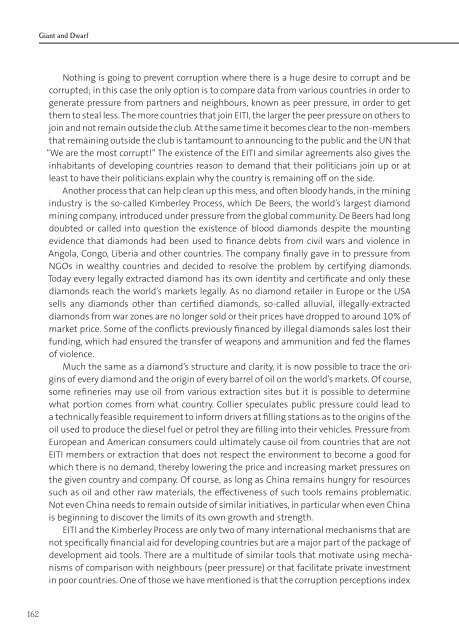Giant_and_Dwarf-FIN
Giant_and_Dwarf-FIN
Giant_and_Dwarf-FIN
Create successful ePaper yourself
Turn your PDF publications into a flip-book with our unique Google optimized e-Paper software.
<strong>Giant</strong> <strong>and</strong> <strong>Dwarf</strong>Nothing is going to prevent corruption where there is a huge desire to corrupt <strong>and</strong> becorrupted; in this case the only option is to compare data from various countries in order togenerate pressure from partners <strong>and</strong> neighbours, known as peer pressure, in order to getthem to steal less. The more countries that join EITI, the larger the peer pressure on others tojoin <strong>and</strong> not remain outside the club. At the same time it becomes clear to the non-membersthat remaining outside the club is tantamount to announcing to the public <strong>and</strong> the UN that“We are the most corrupt!” The existence of the EITI <strong>and</strong> similar agreements also gives theinhabitants of developing countries reason to dem<strong>and</strong> that their politicians join up or atleast to have their politicians explain why the country is remaining off on the side.Another process that can help clean up this mess, <strong>and</strong> often bloody h<strong>and</strong>s, in the miningindustry is the so-called Kimberley Process, which De Beers, the world’s largest diamondmining company, introduced under pressure from the global community. De Beers had longdoubted or called into question the existence of blood diamonds despite the mountingevidence that diamonds had been used to finance debts from civil wars <strong>and</strong> violence inAngola, Congo, Liberia <strong>and</strong> other countries. The company finally gave in to pressure fromNGOs in wealthy countries <strong>and</strong> decided to resolve the problem by certifying diamonds.Today every legally extracted diamond has its own identity <strong>and</strong> certificate <strong>and</strong> only thesediamonds reach the world’s markets legally. As no diamond retailer in Europe or the USAsells any diamonds other than certified diamonds, so-called alluvial, illegally-extracteddiamonds from war zones are no longer sold or their prices have dropped to around 10 % ofmarket price. Some of the conflicts previously financed by illegal diamonds sales lost theirfunding, which had ensured the transfer of weapons <strong>and</strong> ammunition <strong>and</strong> fed the flamesof violence.Much the same as a diamond’s structure <strong>and</strong> clarity, it is now possible to trace the originsof every diamond <strong>and</strong> the origin of every barrel of oil on the world’s markets. Of course,some refineries may use oil from various extraction sites but it is possible to determinewhat portion comes from what country. Collier speculates public pressure could lead toa technically feasible requirement to inform drivers at filling stations as to the origins of theoil used to produce the diesel fuel or petrol they are filling into their vehicles. Pressure fromEuropean <strong>and</strong> American consumers could ultimately cause oil from countries that are notEITI members or extraction that does not respect the environment to become a good forwhich there is no dem<strong>and</strong>, thereby lowering the price <strong>and</strong> increasing market pressures onthe given country <strong>and</strong> company. Of course, as long as China remains hungry for resourcessuch as oil <strong>and</strong> other raw materials, the effectiveness of such tools remains problematic.Not even China needs to remain outside of similar initiatives, in particular when even Chinais beginning to discover the limits of its own growth <strong>and</strong> strength.EITI <strong>and</strong> the Kimberley Process are only two of many international mechanisms that arenot specifically financial aid for developing countries but are a major part of the package ofdevelopment aid tools. There are a multitude of similar tools that motivate using mechanismsof comparison with neighbours (peer pressure) or that facilitate private investmentin poor countries. One of those we have mentioned is that the corruption perceptions index162


